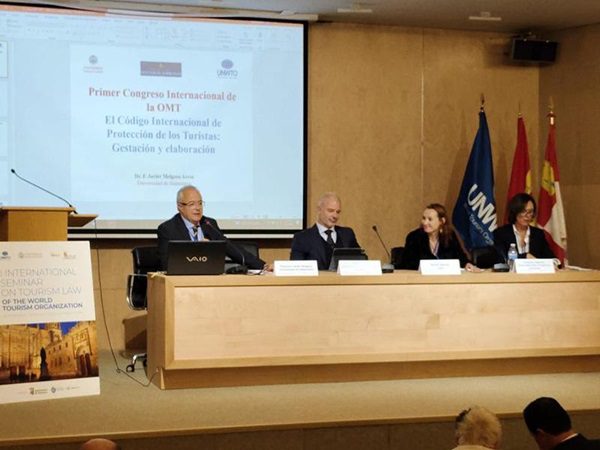 In a historic move, the United Nations World Tourism Organization (UNWTO) recently led a seminal seminar in Salamanca, Spain, marking a pivotal moment in international tourism law. The event, held from November 30th to December 1st, 2023, served as a melting pot of legal experts, academics, and industry leaders, converging to reshape the legal landscape of global tourism.
In a historic move, the United Nations World Tourism Organization (UNWTO) recently led a seminal seminar in Salamanca, Spain, marking a pivotal moment in international tourism law. The event, held from November 30th to December 1st, 2023, served as a melting pot of legal experts, academics, and industry leaders, converging to reshape the legal landscape of global tourism.
A Milestone Code for Tourist Protection
In response to the tumultuous era defined by the pandemic, the UNWTO crafted a monumental legal framework aimed at safeguarding tourists worldwide. This landmark initiative, known as the International Code for the Protection of Tourists, emerged from the collaborative efforts of over 100 countries and private sector entities. Within a mere two-year span, 22 nations have pledged allegiance to this visionary code, recognizing its crucial role in reinstating trust in international travel.
The Inaugural Legal Seminar: A Deep Dive into New Norms
Jointly orchestrated by the UNWTO, the University of Salamanca, and Paris 1 Panthéon-Sorbonne University, this inaugural seminar delved into the intricacies of the Code, examining its impact and future challenges. This event underscored the growing recognition of Tourism Law as an independent legal field, reflecting a significant shift in international legal perspectives.
Unveiling Tourism Law: A New Frontier in International Jurisprudence
A series of dynamic panel discussions illuminated the seminar, featuring esteemed contributors from UNESCO, the International Maritime Organization, and other prominent organizations. These discussions revolved around the integration of Tourism Law into the broader legal ecosystem, highlighting the establishment of a specialized PhD program in Tourism Law as a testament to its burgeoning significance.
Crisis Management and Standardized Protection: The Code’s Core
A central theme of the seminar was the Code’s potential in crisis management, drawing lessons from the pandemic era. Discussions extended to the establishment of minimum standards for tourist protection, addressing contractual nuances in emergencies, and digital service considerations. These deliberations culminated in recommendations for best practices, marking a significant stride towards comprehensive tourist safety.
Case Studies and Best Practices: Learning from Leading Nations
The seminar shone a spotlight on countries exemplifying adherence to the Code, with Uruguay taking centre stage. Uruguay’s national application of the Code through specific legislation serves as a benchmark for others. Panelists articulated how crises can be transformed into opportunities for balancing responsibilities among nations, businesses, and tourists.
The First Observatory on Tourism Law: A Digital Leap for Latin America and the Caribbean
A noteworthy highlight was the introduction of the first Observatory on Tourism Law for Latin America and the Caribbean. This digital tool, a collaborative effort between UNWTO and the Interamerican Development Bank, is poised to become a cornerstone for legal research and recommendations in tourism, aiding member states in developing pertinent tourism legislation.
Concluding Remarks: The Seminar’s Impact on Global Tourism
The UNWTO’s seminar in Salamanca stands as a beacon of progress in the legal realm of tourism. It not only showcased the International Code’s successes and challenges but also illuminated the path forward for legal frameworks in the tourism sector. This seminal event has unequivocally set the stage for a new era in international tourism law, promising a future where legal certainty and tourist protection are paramount.
The seminar’s outcomes underscore a unified commitment to enhancing global tourism through legal innovation and collaboration. As nations and industry stakeholders navigate the complex dynamics of global travel, the principles and practices emanating from this seminar will undoubtedly shape the legal contours of tourism for years to come.
Written by: Anne Keam



















